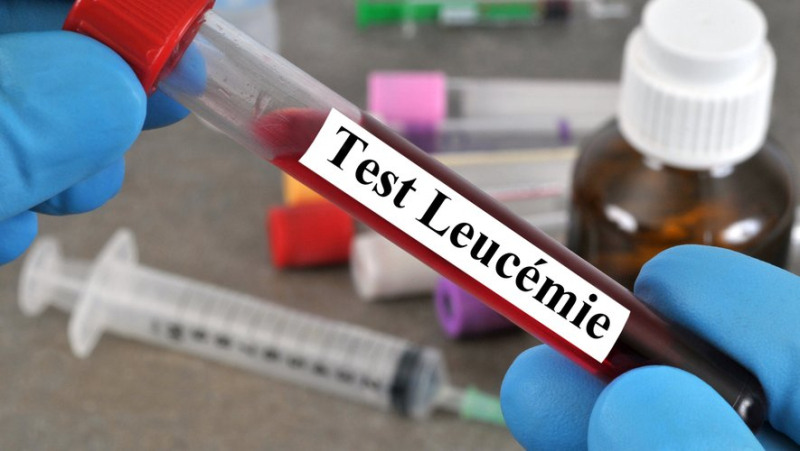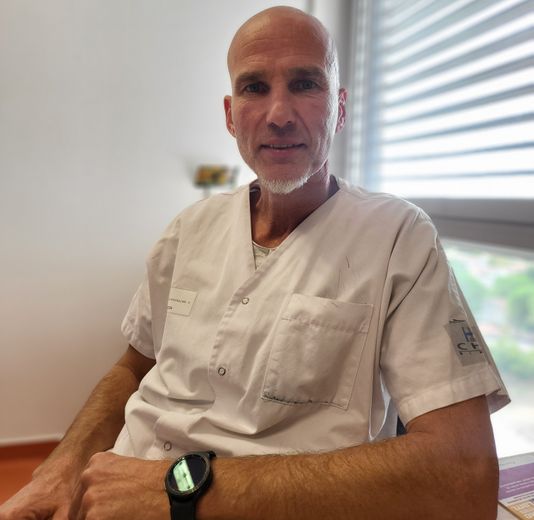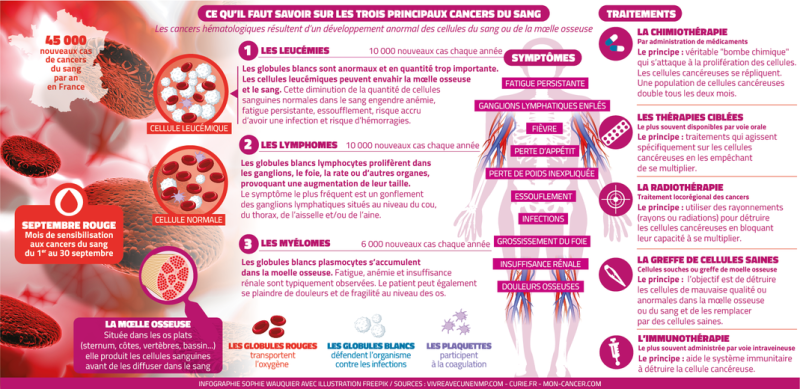Red September: “There is less awareness of blood cancers, we need to make ourselves heard”

Leukemia is the best-known blood cancer. MAXPPP – Richard Villalon
Each year, blood cancers affect around 45,000 people in France, or 12% of new cases of cancer, recalls the association Vivre avec une NMP, NMP for "myeloproliferative neoplasia", one of the blood cancers at the origin of the Red September awareness campaign. Stefan Wickenhauser, hematologist at the Nîmes University Hospital, takes stock of these still little-known cancers.
The association Living with an MPN is mobilizing to “raise awareness of these little-known and misunderstood diseases”, make “advance research”, “inform and support patients”.
Stefan Wickenhauser, head of the clinical hematology department at Nîmes University Hospital, provides an update on progress in care and research in course.

Stefan Wickenhauser is head of the clinical hematology department at the Nîmes University Hospital. DR
Blood cancer remains, for the general public, associated with leukemia, but it is a broader reality…
Blood cancers are less subject to prevention and awareness campaigns than other cancers. We need to highlight the work of doctors and researchers, and communicate about blood cancers.
There are acute cancers, which often require heavy treatment, with often long hospitalizations in intensive care, and chronic diseases that must be treated with often targeted therapies.
These are cancers that appear at any age of life…
At any age, yes. Some occur more in older people, others in younger people, such as Hodgkin's disease.
For several years, there has been talk of a surge in certain cancers, particularly in younger people. This is also the case for blood cancers?
The incidence of serious diseases such as acute leukemia is virtually unchanged. In the region, we still have between 40 and 50 new cases of acute leukemia each year.
We are not in the problem of pancreatic cancer.
“We have not understood all the reasons for the appearance of blood cancers”
We talk a lot about environmental risk factors, these are cancers that are linked to environmental issues, it is a given?
It is a fact, studies show that there are more blood cancers among farmers, particularly lymphomas.
But this is an avenue that still needs to be explored further. We have not fully understood the reasons for the appearance of blood cancers, particularly acute leukemia.
Red September, launched in 2022 at the initiative of the association Vivre avec une NMP, mobilizes for research, it is already very active on blood cancers ?
Yes, and this research in hematology has sometimes made it possible to identify drugs that can also be used in other diseases. Monoclonal antibodies, such as rituximab, were first used in blood cancers. Some targeted therapies too.

Cancers that affect 45,000 people in France each year. Midi Libre – SOPHIE WAUQUIER
There are also CAR-T cells, genetically modified T lymphocytes reinjected into patients and capable of recognizing and specifically destroying cancer cells…
Yes, the technique is now reserved for certain lymphomas, myelomas and acute leukemias, with increasingly early indications. Instead of being used as a last resort, they are being used earlier and earlier. For certain aggressive lymphomas, they are now used in second line, and sometimes, in clinical trials, for a lymphoma with an unfavorable prognosis, in first line. Perhaps the technique will one day be used against solid tumors. For now, this is not the case.
Allogeneic grafts, with bone marrow transplantation, have also been developed to treat blood cancers.
“We believe in targeted therapies that make it possible to avoid heavy chemotherapy”
There are two major revolutions in cancerology, immunotherapy and artificial intelligence, they are used in blood cancers?
Immunotherapy, yes, already. Artificial intelligence will help us decide on certain therapeutic choices, and to allow patients to access innovation.
In Nîmes, we are a reference center for myeloproliferative syndromes, for myelofibrosis… and clinical trials to propose for almost every lymphoid and myeloid disease.
We have about thirty clinical trials in progress.
What treatment do you hope for tomorrow ?
CAR-T cells should gain momentum, even though they have side effects and are expensive. We also believe in targeted therapies that avoid heavy chemotherapy.
Blood cancers have a rather good prognosis ?
Yes, more than some solid tumors, even if some diseases have a poor prognosis.
What is the purpose of Red September ?
We are trying to highlight the work of doctors and researchers, who are less subject to awareness and mobilization campaigns. It's very recent, since 2022. We need to take action and make ourselves heard.
Knowing that there is no screening or prevention, and that we lack specialists in hematology, with larger active patient queues, given the aging of the population. We need more resources. In Nîmes, the team is rebuilding. I am Austrian, we have a Lebanese colleague, another Spanish colleague is arriving… we lack doctors.
I subscribe to read the rest




